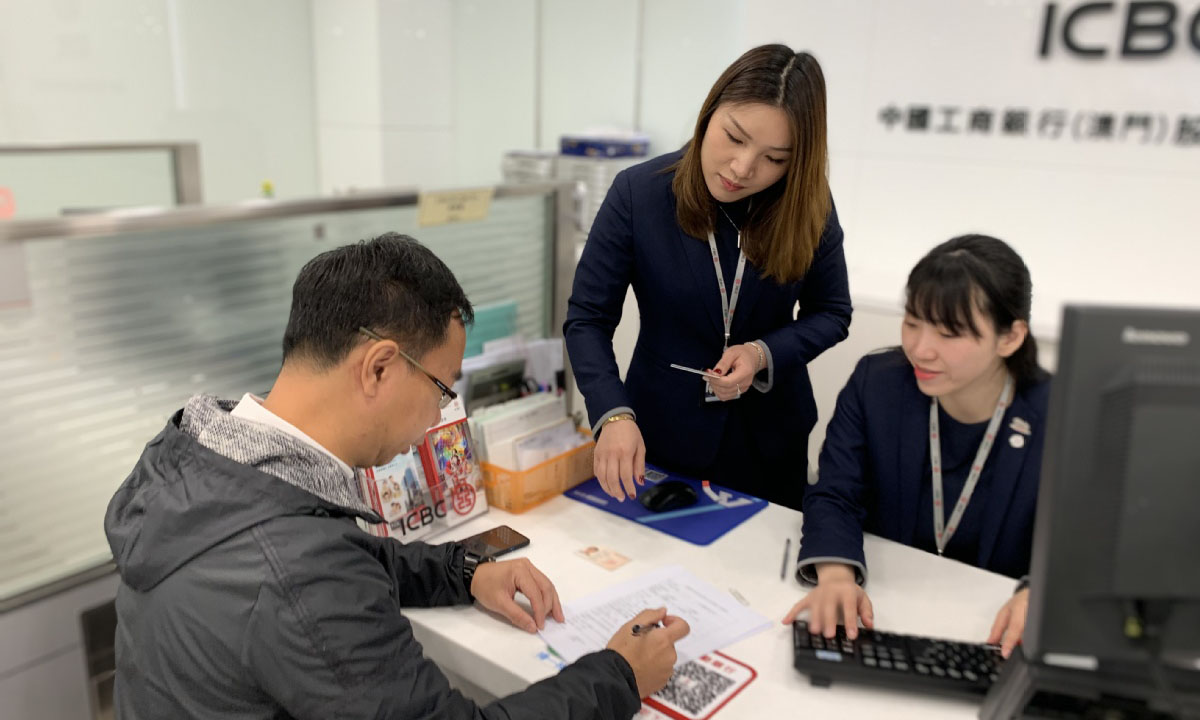PBOC seeks views on WMP pilot

Employees of Industrial and Commercial Bank of China in Macao help a local resident carry out a transaction. ZHONG XIN/CHINA NEWS SERVICE
The People's Bank of China, the central bank, on Thursday released a document with fresh details, including quotas, on the proposed Greater Bay Area Cross-Boundary Wealth Management Connect and sought public feedback on the same.
The WMC is a pilot program that proposes to facilitate residents of the GBA, which spans nine cities in Guangdong province, and Hong Kong and Macao, to make cross-boundary investment in wealth management products, or WMPs, distributed by banks in the GBA.
What is noteworthy in the document is the proposed aggregate quota of 150 billion yuan ($23.22 billion) and a limit of 1 million yuan per person for cross-boundary WMP investments in the GBA.
The central bank would be able to adjust the two quotas in certain situations. Its local branches in GBA will report on the usage under the aggregate quota on each working day, the PBOC said.
The PBOC, financial regulators of banking, insurance and security investment services, the Hong Kong Monetary Authority and the Monetary Authority of Macao jointly issued the regulatory details included in the document.
The connect program, if implemented, will mark a further step toward convertibility of the renminbi, the Chinese currency, under the capital account.
The pilot proposes that GBA residents can buy WMPs via a close-loop channel of funds within the banking system. The pilot will likely have both southbound and northbound components, according to the PBOC document.
Southbound investors should be residents of the nine cities in Guangdong province and have a minimum of two years of investment experience, with no less than 1 million yuan in net family financial assets at the end of each month over the last three months. Or, they should have total family financial assets of no less than 2 million yuan at the end of each month over a period of three months to the investment day.
Cross-boundary remittances will be renminbi-denominated, with currency conversion conducted in offshore markets. Fund transactions will be conducted through the PBOC's Cross-Boundary Inter-Bank Payments System, or the CIPS, according to the document.
Experts said the pilot program aims to support development of the GBA and deepen financial cooperation between the mainland, Hong Kong and Macao, with a view to promote the opening up of the mainland's financial markets.
They also said cross-boundary remittances under the scheme will be conducted and managed in a closed-loop through the bundling of designated remittance and investment accounts, to ensure the funds are used only for WMP investments.
Anthony Lin, CEO of Greater Bay Area, Standard Chartered, welcomed fresh details of the pilot program. This, he said, will help "banks to prepare for the reported launch of the Wealth Management Connect later this year".
Standard Chartered's clients on the mainland generally prefer fixed-income products for cross-boundary investment. They are also more interested in stocks of Chinese companies listed in offshore markets, as well as US dollar-denominated bonds issued by Chinese companies, Lin said.
He further said investors in Hong Kong and Macao generally look for higher returns from mainland assets, especially those related to the "new economy" and in areas of consumption, infrastructure, manufacturing and technology, as well as RMB-denominated assets.
Standard Chartered has set up a project team to prepare for the Wealth Management Connect. In April, it launched the first fund product under the Qualified Domestic Institutional Investor program, which helps investors on the mainland to invest in GBA-related assets.
Photos
Related Stories
- China's financial authorities conduct talks with Ant Group again
- China's central bank sets key tasks for 2021
- China's central bank vows to keep monetary policy consistent
- China's central bank issues 10 bln yuan of bills in Hong Kong
- Chinese banks phase out use of "counter-cyclical" factor in yuan pricing: regulator
Copyright © 2021 People's Daily Online. All Rights Reserved.










